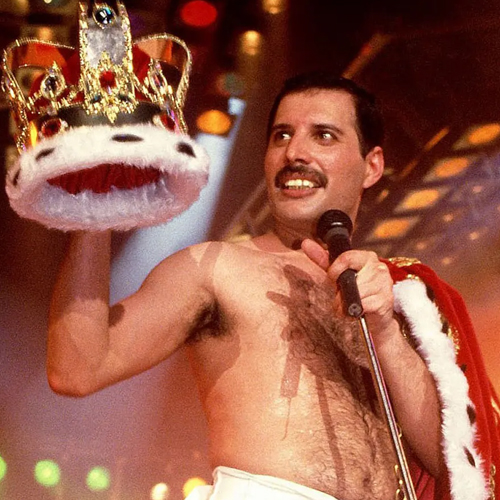
Freddie Mercury (Queen)
Born: 5 September 1946
Died: 24 November 1991 (45 Years)
Cause: The cause of death was bronchial pneumonia resulting from AIDS.
Died: 24 November 1991 (45 Years)
Cause: The cause of death was bronchial pneumonia resulting from AIDS.
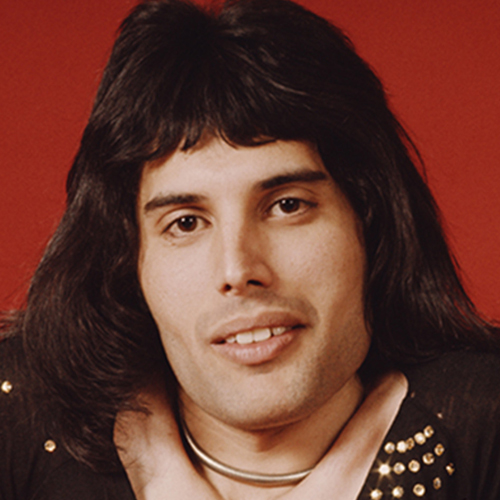
Freddie Mercury
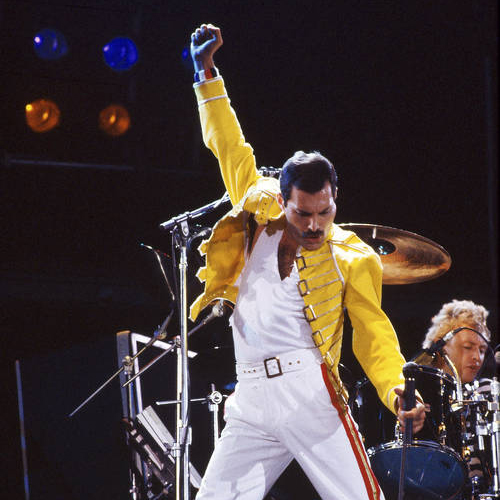
Freddie Mercury
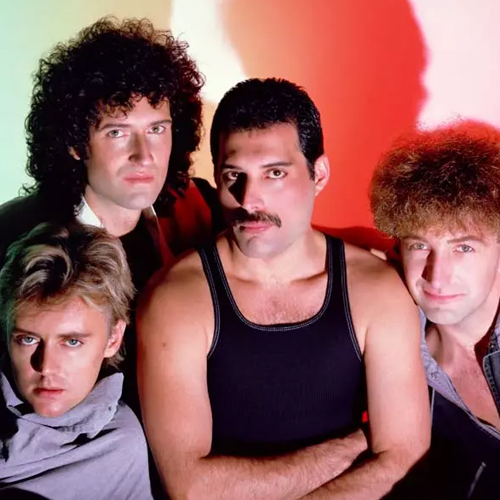
Queen
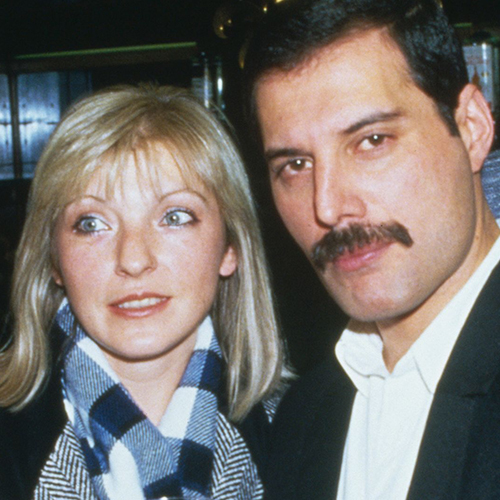
Freddie Mercury
Freddie Mercury (born Farrokh Bulsara; 5 September 1946 – 24 November 1991) was a British singer and songwriter, who achieved worldwide fame as the lead vocalist of the rock band Queen. Regarded as one of the greatest singers in the history of rock music, he was known for his flamboyant stage persona and four-octave vocal range. Mercury defied the conventions of a rock frontman with his theatrical style, influencing the artistic direction of Queen.
Born in 1946 in Zanzibar to Parsi-Indian parents, Mercury attended English-style boarding schools in India from the age of eight and returned to Zanzibar after secondary school. In 1964, his family fled the Zanzibar Revolution, moving to Middlesex, England. Having studied and written music for years, he formed Queen in 1970 with guitarist Brian May and drummer Roger Taylor. Mercury wrote numerous hits for Queen, including "Killer Queen", "Bohemian Rhapsody", "Somebody to Love", "We Are the Champions", "Don't Stop Me Now" and "Crazy Little Thing Called Love". His charismatic stage performances often saw him interact with the audience, as displayed at the 1985 Live Aid concert. He also led a solo career and was a producer and guest musician for other artists.
Mercury was diagnosed with AIDS in 1987. He continued to record with Queen, and posthumously featured on their final album, Made in Heaven (1995). He announced his diagnosis the day before his death, from complications from the disease, in 1991 at the age of 45. In 1992, a concert in tribute to him was held at Wembley Stadium, in benefit of AIDS awareness. His career with Queen was dramatised in the 2018 biopic Bohemian Rhapsody.
As a member of Queen, Mercury was posthumously inducted into the Rock and Roll Hall of Fame in 2001, the Songwriters Hall of Fame in 2003, and the UK Music Hall of Fame in 2004. In 1990, he and the other Queen members were awarded the Brit Award for Outstanding Contribution to British Music, and one year after his death, Mercury was awarded it individually. In 2005, Queen were awarded an Ivor Novello Award for Outstanding Song Collection from the British Academy of Songwriters, Composers, and Authors. In 2002, Mercury was voted number 58 in the BBC's poll of the 100 Greatest Britons.
On the evening of 24 November 1991, about 24 hours after issuing the statement, Mercury died at the age of 45 at his home in Kensington. The cause of death was bronchial pneumonia resulting from AIDS. His close friend Dave Clark of the Dave Clark Five was at the bedside vigil when Mercury died. Austin phoned Mercury's parents and sister to break the news, which reached newspaper and television crews in the early hours of 25 November.
Mercury's funeral service was conducted on 27 November 1991 by a Zoroastrian priest at West London Crematorium, where he is commemorated by a plinth under his birth name. In attendance at Mercury's service were his family and 35 of his close friends, including Elton John and the members of Queen. His coffin was carried into the chapel to the sounds of "Take My Hand, Precious Lord"/"You've Got a Friend" by Aretha Franklin. In accordance with Mercury's wishes, Mary Austin took possession of his cremated remains and buried them in an undisclosed location. The whereabouts of his ashes are believed to be known only to Austin, who has said that she will never reveal them.
Mercury spent and donated to charity much of his wealth during his lifetime, with his estate valued around £8 million at the time of his death. He bequeathed his home, Garden Lodge, and the adjoining Mews, as well as a 50% of all privately owned shares, to Mary Austin. His sister, Kashmira Cooke, received 25%, as did his parents, Bomi and Jer Bulsara, which Cooke acquired upon their deaths. He willed £500,000 to Joe Fannelli; £500,000 to Jim Hutton; £500,000 to Peter Freestone; and £100,000 to Terry Giddings. Mercury, who never drove a car because he had no licence, was often chauffeured around London in his Rolls-Royce Silver Shadow from 1979 until his death. The car was passed to his sister Kashmira who made it available for display at public events, including the West End premiere of the musical We Will Rock You in 2002, before it was auctioned off at the NEC in Birmingham in 2013 for £74,600.
Following his death, the outer walls of Garden Lodge in Logan Place became a shrine to Mercury, with mourners paying tribute by covering the walls in graffiti messages. Three years later Time Out magazine reported that "the wall outside the house has become London's biggest rock 'n' roll shrine". Fans continued to visit to pay their respects with letters appearing on the walls until 2017, when Austin had the wall cleared. Hutton was involved in a 2000 biography of Mercury, Freddie Mercury, the Untold Story, and also gave an interview for The Times in September 2006 for what would have been Mercury's 60th birthday.
(wikipedia)
Born in 1946 in Zanzibar to Parsi-Indian parents, Mercury attended English-style boarding schools in India from the age of eight and returned to Zanzibar after secondary school. In 1964, his family fled the Zanzibar Revolution, moving to Middlesex, England. Having studied and written music for years, he formed Queen in 1970 with guitarist Brian May and drummer Roger Taylor. Mercury wrote numerous hits for Queen, including "Killer Queen", "Bohemian Rhapsody", "Somebody to Love", "We Are the Champions", "Don't Stop Me Now" and "Crazy Little Thing Called Love". His charismatic stage performances often saw him interact with the audience, as displayed at the 1985 Live Aid concert. He also led a solo career and was a producer and guest musician for other artists.
Mercury was diagnosed with AIDS in 1987. He continued to record with Queen, and posthumously featured on their final album, Made in Heaven (1995). He announced his diagnosis the day before his death, from complications from the disease, in 1991 at the age of 45. In 1992, a concert in tribute to him was held at Wembley Stadium, in benefit of AIDS awareness. His career with Queen was dramatised in the 2018 biopic Bohemian Rhapsody.
As a member of Queen, Mercury was posthumously inducted into the Rock and Roll Hall of Fame in 2001, the Songwriters Hall of Fame in 2003, and the UK Music Hall of Fame in 2004. In 1990, he and the other Queen members were awarded the Brit Award for Outstanding Contribution to British Music, and one year after his death, Mercury was awarded it individually. In 2005, Queen were awarded an Ivor Novello Award for Outstanding Song Collection from the British Academy of Songwriters, Composers, and Authors. In 2002, Mercury was voted number 58 in the BBC's poll of the 100 Greatest Britons.
On the evening of 24 November 1991, about 24 hours after issuing the statement, Mercury died at the age of 45 at his home in Kensington. The cause of death was bronchial pneumonia resulting from AIDS. His close friend Dave Clark of the Dave Clark Five was at the bedside vigil when Mercury died. Austin phoned Mercury's parents and sister to break the news, which reached newspaper and television crews in the early hours of 25 November.
Mercury's funeral service was conducted on 27 November 1991 by a Zoroastrian priest at West London Crematorium, where he is commemorated by a plinth under his birth name. In attendance at Mercury's service were his family and 35 of his close friends, including Elton John and the members of Queen. His coffin was carried into the chapel to the sounds of "Take My Hand, Precious Lord"/"You've Got a Friend" by Aretha Franklin. In accordance with Mercury's wishes, Mary Austin took possession of his cremated remains and buried them in an undisclosed location. The whereabouts of his ashes are believed to be known only to Austin, who has said that she will never reveal them.
Mercury spent and donated to charity much of his wealth during his lifetime, with his estate valued around £8 million at the time of his death. He bequeathed his home, Garden Lodge, and the adjoining Mews, as well as a 50% of all privately owned shares, to Mary Austin. His sister, Kashmira Cooke, received 25%, as did his parents, Bomi and Jer Bulsara, which Cooke acquired upon their deaths. He willed £500,000 to Joe Fannelli; £500,000 to Jim Hutton; £500,000 to Peter Freestone; and £100,000 to Terry Giddings. Mercury, who never drove a car because he had no licence, was often chauffeured around London in his Rolls-Royce Silver Shadow from 1979 until his death. The car was passed to his sister Kashmira who made it available for display at public events, including the West End premiere of the musical We Will Rock You in 2002, before it was auctioned off at the NEC in Birmingham in 2013 for £74,600.
Following his death, the outer walls of Garden Lodge in Logan Place became a shrine to Mercury, with mourners paying tribute by covering the walls in graffiti messages. Three years later Time Out magazine reported that "the wall outside the house has become London's biggest rock 'n' roll shrine". Fans continued to visit to pay their respects with letters appearing on the walls until 2017, when Austin had the wall cleared. Hutton was involved in a 2000 biography of Mercury, Freddie Mercury, the Untold Story, and also gave an interview for The Times in September 2006 for what would have been Mercury's 60th birthday.
(wikipedia)

